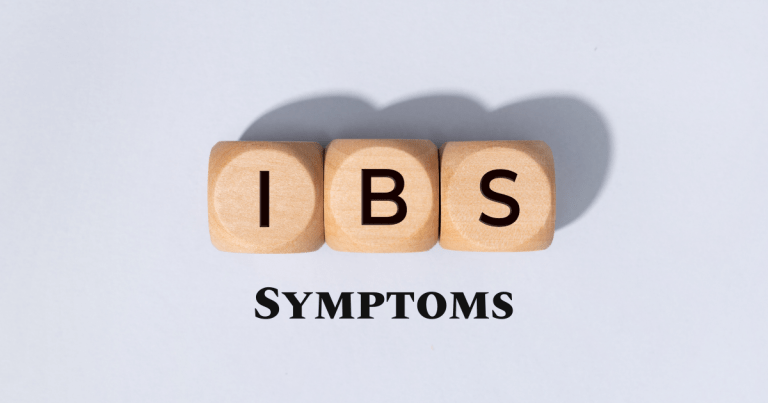What is Irritable Bowel Syndrome (IBS)?
Irritable Bowel Syndrome (IBS) is a is a condition of the digestive tract often described as having a combination of several features, including pain, diarrhoea, constipation, bloating and gas.
IBS has been defined by the International Foundation for Functional Gastrointestinal Disorders as a syndrome with symptoms related to bowel function that are present in the absence of structural abnormalities or other specific disease entities.
How common is IBS?
IBS affects 4 to 9% of the global population (Oka et al., 2020). IBS can affect people of any age and gender. But, it is more prevalent in people below 50 and affects more women than men (Lacy et al., 2016).
IBS symptoms
IBS symptoms vary from person to person and may include some or all of the following:
- Changes in bowel movements (chronic constipation or diarrhea)
- Bloating
- Abdominal pain or stomach cramps
- The urgency to have a bowel movement
- The sensation of incomplete evacuation
- Mucus in stool
- Gas or distension
- Nausea
IBS diagnosis
There is no one specific test for IBS. Your doctor will diagnose IBS based on particular symptom patterns using what is called the IBS Rome IV criteria and excluding other conditions following diagnostic investigations such as blood tests, stool sample analysis, x-ray, CT scan or MRI scan.
IBS Rome IV Criteria
To confirm a diagnosis of IBS, your doctor will assess your symptoms based on the IBS Rome IV Criteria (Lacy et al., 2016):
“Recurrent abdominal pain, on average, at least 1 day per week in the last 3 months, associated with 2 or more of the following criteria:
1. Related to defecation
2. Associated with a change in the frequency of stool
3. Associated with a change in form (appearance) of stool.”
Patients must meet these criteria for the last 3 months, and the symptoms should have begun at least 6 months before diagnosis.
Subtypes of Irritable Bowel Syndrome
Patients who meet the diagnostic criteria for IBS can be further classified into one of three subtypes of IBS:
Irritable Bowel Syndrome with Diarrhoea (IBS-D)
IBS with diarrhoea is the most common subtype, affecting 32% of IBS patients (Oka et al., 2020). Patients with this subtype of IBS have more than one out of every four stools described as type 6 or 7 diarrhoea based on the Bristol stool classification system. Bristol type 6 stools are described as fluffy pieces with ragged edges or a mushy stool, and Bristol type 7 stools are described as watery, with no solid pieces or entirely liquid.
Irritable Bowel Syndrome with Constipation (IBS-C)
IBS with constipation affects 29% of IBS patients (Oka et al., 2020). Patients with this subtype of IBS have more than one in four stools described as type 1 or 2 constipation based on the Bristol stool classification system. Bristol type 1 stool looks like separate hard lumps or like nuts and can be hard to pass), and Bristol type 2 stools are sausage-shaped but lumpy.
Irritable Bowel Syndrome with Constipation and Diarrhoea (IBS-M)
Mixed IBS with alternating constipation and diarrhoea affects 26% of IBS patients (Oka et al., 2020). Patients with this subtype typically have variable bowel habits, with at least a quarter of stools described as diarrhoea and at least a quarter of stools described as constipation.
Irritable Bowel Syndrome Unclassified (IBS-U)
Patients who can not be classified into the above three categories have Unclassified IBS (IBS-U). Around 12% of IBS patients are in this category (Oka et al., 2020).
Other symptoms of IBS
Abdominal pain, cramping and spasms
IBS is sometimes referred to as “spastic colon” or “irritable colon” because some people with this condition experience intense intestinal contractions that cause pain.
It may be relieved by passing stool or gas, but it is often not related to the timing of bowel movements.
IBS discomfort can be mild to severe and is often worse after eating.
For some people, the pain is so debilitating that it significantly interferes with their ability to carry out daily activities.
Bloating
There is usually bloating in the abdomen (feeling full or having a ‘pouch’) and often some wind. The symptoms tend to come and go over time but can sometimes be continuous.
Gas or distention
People with IBS often have increased gas and bloating. The gas may be accompanied by burping or belching.
Nausea
People with IBS may also experience nausea, which can be mild to severe. Nausea may be worse after eating or during a flare-up of symptoms.
Lethargy
People with IBS often feel very tired, even after a good night’s sleep. The fatigue can be so severe that it interferes with work, social activities and exercise.
Urinary symptoms
Some people with IBS also have urinary symptoms such as urgency, frequency or incontinence.
Chest pain
Some people with IBS also experience chest pain, which may be similar to the pain of heartburn or a heart attack.
Back pain and IBS
Back pain with IBS is a common symptom, although it is not always associated with the condition itself. Patients with IBS may experience referred pain in the back due to intestinal contractions or spasms. Muscle pain and tenderness can be worse during IBS flare-ups.
Causes of Irritable Bowel Syndrome
The exact cause of IBS is unknown, but it is thought that the following factors can trigger symptoms of IBS:
- Abnormalities in the muscles of the bowel
- Abnormalities in the nerves that control bowel function
- The gut-brain axis abnormalities (the bidirectional communication between the gastrointestinal tract and the brain)
- Increased sensitivity to pain in the intestine
- Stress or psychological factors
- Diet and lifestyle, for example, sensitivity to certain foods
When to see a doctor?
Most people with IBS can be diagnosed based on their symptoms. However, it is important to see a doctor if you experience any of the following:
- Unexplained weight loss
- Blood in your stool
- Fever
- Persistent abdominal pain that is not relieved by passing stool or gas
- Symptoms that are interfering with your daily activities
When these symptoms are present, it is essential to see a specialist, for example, a gastroenterologist, to rule out other conditions with similar bowel symptoms, such as:
- Inflammatory Bowel Disease (IBD)
- Celiac disease
- Colon cancer
- Liver disease
- Crohn’s disease
- Ulcerative colitis
- Endometriosis
- Kidney disease
How is Irritable Bowel Syndrome treated?
There is no one-size-fits-all approach to treating IBS. The goal of treatment is to relieve symptoms and improve quality of life.
Treatment options may involve dietary changes, medication, stress management, or a combination of these. Some of the commonly used treatments are outlined below.
Medication
There are several different types of medication used to treat IBS. These may include:
- Antispasmodics: to relieve cramping and pain by relaxing the muscles of the intestine
- Laxatives: to relieve constipation
- Antidiarrheals: to relieve diarrhoea
- Antidepressants: to relieve depression and anxiety, which may be contributing
Gut-Directed Hypnotherapy for IBS
One of the most effective treatments for IBS is Gut Directed Hypnotherapy. It is proven to be effective in reducing IBS symptoms, including abdominal pain, bloating, gas, constipation, and diarrhoea, and the improvements last for years.
Low FODMAP diet for IBS
The low FODMAP diet (a diet low in FODMAP foods) has been shown to be effective in reducing symptoms of IBS in some patients but can be difficult to implement.
Stress management and medical education
Medical education is an essential aspect of all IBS treatments. Many people with IBS find that understanding and learning about their condition helps them to manage it better.
Lifestyle changes
Lifestyle changes such as exercising regularly and getting adequate sleep can also help to reduce IBS symptoms.
Summary
IBS is a condition that affects the gastrointestinal tract. Symptoms include abdominal pain, cramping, bloating, gas, diarrhoea or constipation. The exact cause of IBS is unknown, but it is thought to be due to a combination of factors. There is no one specific test for IBS, but your doctor may perform some investigations to rule out other conditions. Treatment may involve dietary changes, Gut Directed Hypnotherapy, medication, stress management, or a combination of these.
Further reading and references
Complementary and Integrative Health https://www.nccih.nih.gov/health/irritable-bowel-syndrome-in-depth
Harer, K. N. & Eswaran, S. L. Irritable Bowel Syndrome Food as a Friend or Foe? Gastroenterol Clin N 50, 183–199 (2020) https://doi.org/10.1016/j.gtc.2020.10.002
Lacy, B. E. et al. Bowel Disorders. Gastroenterology 150, 1393-1407.e5 (2016) https://doi.org/10.1053/j.gastro.2016.02.031
National Institute of Diabetes and Digestive and Kidney Diseases (NIDDK) https://www.niddk.nih.gov/health-information/digestive-diseases/irritable-bowel-syndrome
Oka, P. et al. Global prevalence of irritable bowel syndrome according to Rome III or IV criteria: a systematic review and meta-analysis. Lancet Gastroenterology Hepatology 5, 908–917 (2020) https://doi.org/10.1016/S2468-1253(20)30217-X







